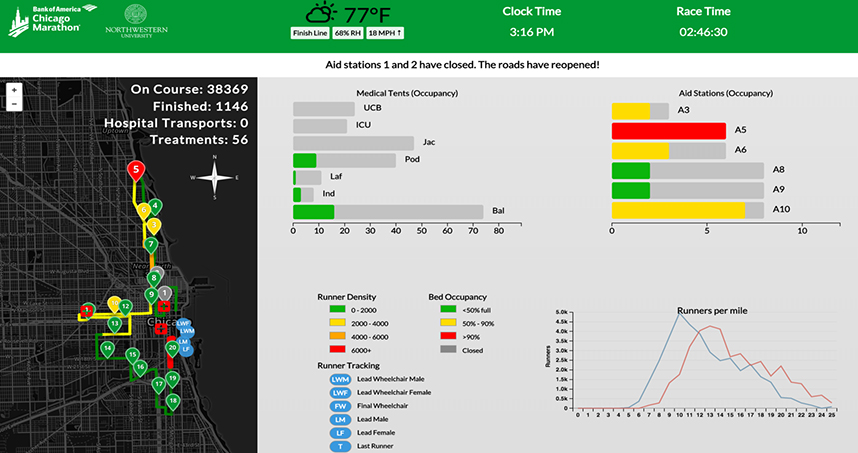Engineers Assist Bank of America Chicago Marathon with Technology
Data analytics team and ‘dashboard’ will be stationed in Forward Command Oct. 11
Thousands of participants in this Sunday’s Bank of America Chicago Marathon will run the race as marathon organizers, with key assistance from a Northwestern University and Chicago Marathon research team, will utilize big data — both historic and real-time — to supply a comprehensive picture of the race as it unfolds.
Northwestern logistics expert Karen Smilowitz and her team of four engineering students have custom-designed a new data visualization system that provides a computer simulation of the 26.2-mile race. Using data from the last seven Bank of America Chicago Marathons and from runners in this year’s race, the system can forecast where large concentrations of participants will be 20 minutes later and help race officials to plan accordingly.
Two large one-stop “dashboards” in the busy forward command tent will display the race simulation and important course conditions onscreen at the same time: location of lead runners, runner density on the course, medical tent and aid station capacity, current temperature, alerts of any issues on the course, and much more.
 “The Bank of America Chicago Marathon is a pioneer in the way they run the marathon, including using electronic data strategically to make an excellent race even better,” said Smilowitz, a professor at the McCormick School of Engineering and Applied Science. “Working together as a team, we have developed a dashboard that has all the important data in one place, enabling information-based decision making.”
“The Bank of America Chicago Marathon is a pioneer in the way they run the marathon, including using electronic data strategically to make an excellent race even better,” said Smilowitz, a professor at the McCormick School of Engineering and Applied Science. “Working together as a team, we have developed a dashboard that has all the important data in one place, enabling information-based decision making.”
Smilowitz is one of the nation’s foremost experts in the study and application of data analytics for mass-scale events. She and her students will be stationed inside forward command for the Oct. 11 marathon, working on various aspects of the data visualization system.
Desktop and mobile versions of the dashboard also will be available, helping staff and volunteers on the course be more connected to the overall race. These versions are firsts for the Chicago Marathon.
Smilowitz, the Charles Deering McCormick Professor in the department of industrial engineering and management sciences, and George T. Chiampas, medical director of the Chicago Marathon and an emergency medicine professor at Northwestern University Feinberg School of Medicine, are leading the multi-year joint project.
“Our data analytics collaboration continues to help the Bank of America Chicago Marathon best prepare for a mass gathering of the marathon’s magnitude -- including medical preparedness, public safety and security,” Chiampas said. “The visual computer simulation will help us foresee what is likely to occur before it does.”
The data visualization system uses a large volume of health, performance and situational data from every Chicago Marathon since 2008 and periodic data from timing chips in the shoes of runners in this year’s marathon.
Two dashboards will be displayed in forward command, visible from any point in the tent. Forward command is where race organizers and representatives of key city agencies track the progress of the race, coordinate logistics and respond immediately to any issues that arise.
The researchers also designed a secure desktop version, similar in design to the forward command display but with more information, for authorized users, and a mobile version with limited data access, available to anyone with the link.
Smilowitz’s team includes Sam Young, Rachel Lin and Ryan Rose, all undergraduate students, and Bruno Peynetti Velazquez, a master’s degree student. These five will be in forward command during the race, while team member Mehmet Basdere, a Ph.D. student who is conducting research on course design, will be running the marathon, his first.
The research project, which began in 2013, is funded by a National Science Foundation “GOALI” grant for academia-industry collaborations.
Partly as a result of the seminal work she has done with the Chicago Marathon, Smilowitz has become a key data adviser to the Chevron Houston Marathon and has provided guidance to the Boston Marathon, among others. Her larger area of research is humanitarian logistics, in which she helps governments manage recovery efforts in the wake of natural disasters.
About the Bank of America Chicago Marathon
In its 38th year, the Bank of America Chicago Marathon welcomes thousands of runners from more than 100 countries and all 50 states, including a world-class elite field, top regional and masters runners, race veterans, debut marathoners and charity runners. The race’s iconic course takes runners through 29 vibrant neighborhoods on an architectural and cultural tour of Chicago. In 2014, an estimated 1.7 million spectators lined the streets cheering on a record 40,659 runners from the start line to the final stretch down Columbus Drive. As a result of the race’s national and international draw, the Chicago Marathon assists in raising millions of dollars for a variety of charitable causes while generating $253 million in annual economic impact to its host city. The 2015 Bank of America Chicago Marathon, a member of the Abbott World Marathon Majors, will start and finish in Grant Park beginning at 7:30 a.m. Sunday, Oct. 11. In advance of the race, a two-day Abbott Health & Fitness Expo will be held at McCormick Place Convention Center Friday, Oct. 9, and Saturday, Oct. 10. For more information about the event and how to get involved, go to chicagomarathon.com. Visit the Bank of America newsroom for more Bank of America news.
